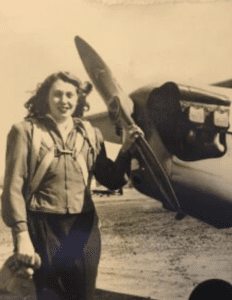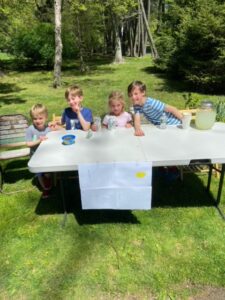In the process of hunting for ways to navigate grandfatherhood, I sought out the advice of my oldest living relative, Aunt Lois, my late mother’s sister. Lois was 95 at…
In the process of hunting for ways to navigate grandfatherhood, I sought out the advice of my oldest living relative, Aunt Lois, my late mother’s sister.
Lois was 95 at the time, frail but sharp as a tack. In her long career Lois was a much-loved music teacher and an accomplished cellist. During WWII she became a pilot to help ferry mail across the United States.
Like my mom, Lois had a sharp, acerbic wit. She and my mom would go for daily dunks in Lake Willoughby wearing matching bathing caps festooned with brightly colored rubber flowers. They’d chat while treading water.
The other thing Lois and my mom had in common was a deep love for their grandchildren. The grandpas I knew loved their grandkids just as much as the grandmas, but it was the grandmas who actually said so. Grandpas showed their love in other ways, like telling stories or simply working with us.
Lois had 6 grandchildren and, thanks to her longevity, lived to enjoy her 5 great-grandchildren as well. Surely, I thought, Lois could speak volumes about how I could be a good grandpa.
I caught up with Lois one day down at the Willoughby beach after her daily dunk, years after my mom had passed. Lois at 95 was like a dry vine that had been bundled into a ball, arms and legs spindly, jaggy fingers twisted in odd directions by arthritis. She could walk with a cane or with a loved one holding her arm, guiding her ship to dock with a thunk into the nearest chair. On the day I quizzed her, she was bundled in a sweater in the late August cool. She wore fabulous pink Jackie Onassis-style big-framed sunglasses.
“Lois, any advice on how I can be a good grandpa?” I asked.
Lois looked thoughtful for a moment, staring out at the lake and the waves swooshing onto the shore. Then she raised one bony finger and pronounced, “Be there for them.”
I waited for her to continue. I figured her statement was merely a preamble to a longer, more eloquent oration. But no, that was it. And the more I thought about it, the more I knew she was right. If she had spoken for a whole day, or a year, she could not have imparted better advice. Abraham Lincoln’s Gettysburg address was a brief 272 words, yet positively verbose by Lois’ standards. Great ideas are a lot like acorns. All the DNA of the tree is there and highly compact. When planted and nourished, the acorn thrives into a massive multi-branched oak tree.
In the case of what Lois had told me, that tree had sprawling branches that hugged and protected all those she loved most.
Lois lived those words. Even up until the last year of her long life, when any movement at all caused her pain, she’d be there for us and her many grand and great grandchildren in myriad ways. Every year on the 4th of July, Lois was the “boat lady” for our annual celebrations at the beach. Around dusk the wind would die down and leave the lake flat as a mirror, and in its reflection the wild roses of dusk bloomed as the sun slowly set. We’d light the bonfire as the whole family gathered around, talking and laughing, and Lois would sit at the picnic table and teach the bustling kids how to fold newspapers into paper boats.
Just as the sun was leaving the sky and the stars began to peek out, adults helped the kids put a match to their boats and launch them onto the water; the shimmering flames of a dozen ships floated slowly out onto the lake, the kids cheering theirs on; the winner would be the last boat still burning.
In her younger days, Lois would stand on the dock and play taps on her bugle. At 95, she sat in her chair and sang along with us around the bonfire, withered with time but still a young mother inside.
Last year Lois passed away quietly in bed. The night before she died, she excitedly told my cousins that she had a busy day ahead of her. She was going to see Ray (her late husband), her sister, mother and father. There was so much to look forward to.
This summer and for all summers to come, the paper boats will still flame and glitter along the shores of the lake at dusk. There’s some of Lois in every fold of those boats, and in every squeal of excitement as the kids set their boats aflame and watch them float and sputter.
It makes me very happy to know that Lois provided me with the best possible advice, and to realize—through my discussions with dozens of grandparents—that there are as many ways to be there for grandkids as there are leaves in a forest.
In my own grandpa life, I’ve found that being there for them can be a chance to teach lessons that will last a lifetime.
I’ve fine-tuned the art of the pillow fight by applying just the right amount of power to each swing of the pillow; enough to score a definitive cushy punch yet still harmless.
There are also opportunities for learning. On a recent weekend morning, my grandkids decided to make a lemonade stand and make enough money to help pay for a video game (their elusive Holy Grail). When they brought it up, I said, “Ok, that’s a great idea. But you should also take into account your cost of goods so you can determine how much profit you’ll make per cup of lemonade sold.”
Their reply: “What?”
This led to a robust discussion, complete with a math exercise, that delved into the cost of the lemonade mix and plastic cups, how much they would charge per cup, and how much they’d ultimately make in profit after subtracting their cost of goods. Over the course of a day they raked in a sizable amount of money at a decent profit.
My son-in-law added a wonderful touch: half the proceeds will be donated to the local fire department.
From my grandkids’ perspective, this was all magic. It felt to them like pulling money out of thin air. Instead of begging their parents to buy them a video game, they showed entrepreneurial spirit and took control of their finances. And they’re not even 10 years old yet.
Being there for the grandkids helps shape them into who they can become in the future, the best version of themselves. They might be making paper boats today, and building real boats in adulthood, or founding a new beverage company. And hopefully giving a percentage of their profits to charity. What a wonderful life lesson for them. And a total blast for us.
When I talk about nurturing the next great generation, this is what I mean. If we can help raise a generation of young people who know how to found and run profitable businesses—and give proceeds to charitable causes—we can change the world.
But let’s not forget the pillow fights. My grandkids are getting bigger by the week and our battles are becoming truly epic. I will show no mercy.





